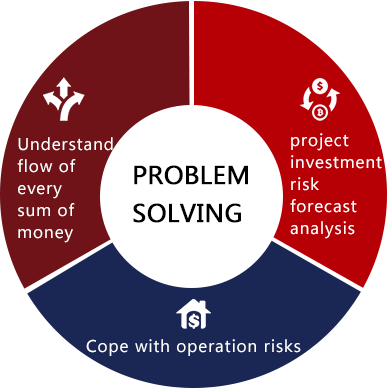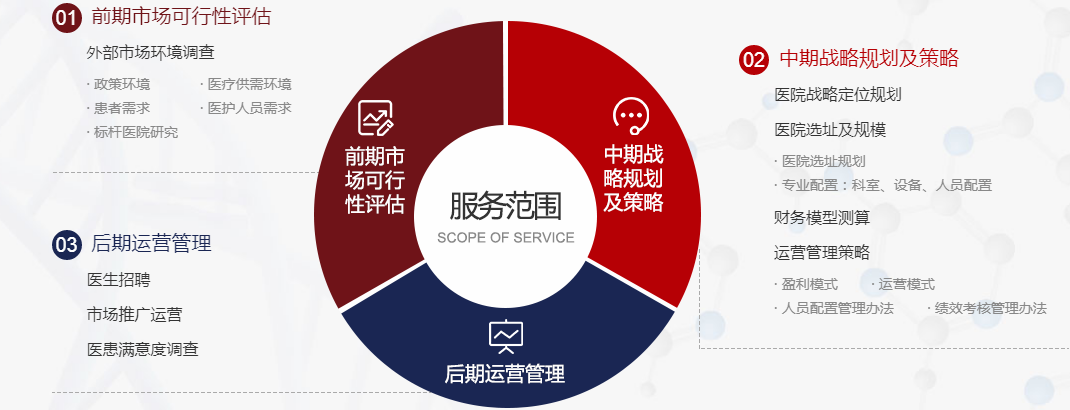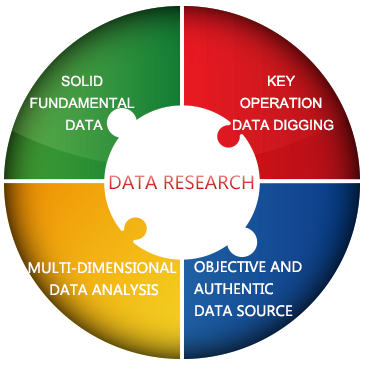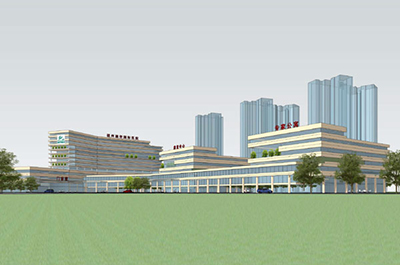






· Hospital is treated as a process in which the internal and external factors of a system interact and the results of the interaction is reflected through digits based on the logic between types of elements. When the result changes, reasons behind the digits will be analyzed so that closed-loop management is formed and sustainable management and optimization are realized.
· The financial model will help leaders make decisions through the dynamic logic relationship between the expected targets and strategic elements and the full reflection of the influence of types of strategic elements on the operation of the hospital

project investment risk forecast analysis

Preliminary preparation

Medium preparation

Post preparation
The grain fineness of the financial calculation model is crucial to the accuracy of prediction of future investment risk and income
As the project is carried out and building, equipment and headcount are in place, the grain of the financial calculation model will finer;
When the core technical team is formed, the main types of diseases or even surgical methods can be determined.

adjust growth target and optimize strategic decision

Data visualization

"Reply" and "deduction"

KPI management
The visualization of the operation data through the financial calculation model shows whether the investment result meets expectation or not, and based on this, the key operation data can be adjusted and operation targets can be reset;
Using actual operation data to do "replay" and "deduction" on the financial calculation model helps analyze abnormal events ( the operation fails to meet or exceeds expected targets)
Key operation data influencing medical income and spending, which are created in early stage, also support the performance management of different functions of the hospital.








Logical positioning and targets: not only financial targets shall be set, strategic elements to achieve these targets shall be clarified
Discipline is the core of financial calculation model and source of business income. Different disciplines have different features, driving factors, talent cultivation periods, technical thresholds, patient characteristics, medical insurance payment modes and profiting modes.
1Based on the customer group positioning, charge standard and operation philosophy of the hospital, select flexible headcount planning to improve service experience or tight headcount planning to improve service efficiency;
2Based on discipline and bed quantity planning, build labor allocation and operation cost models and analyze key cost elements and modify logics based on strategic elements and influencing factors
Capital investment includes on environment facilities, decoration engineering, medical equipment, information system and other hardware. Overall consideration of discipline features and influencing factors ensures specificity and focus.
1Determine classification by outpatient, inpatient and others or segmentation by discipline;
2Determine fundamental data (open bed quantity and outpatient/inpatient operation days per year) and key assumed condition variable factors
3Create functional relationship between fundamental data and key assumed condition variable factors; the operation differentiation of hospitals lies in strategic elements and influencing factor
1Direct cost: e.g. labor and medicine consumables, which are used to create functional relationship;
2Indirect cost: fixed controllable cost (e.g. market operation, HR spending and energy consumption) and fixed noncontrollable cost (depreciation and amortization), which are used to determine key assumed condition variable factors and create functional relationship
1Cash flow balance is critical to the survival of the hospital. The predication of the time at which the cash flow reaches the balance allows for the advance prediction of operation subsidy before balance;
2Reaching cash flow balance means the operation of the hospital is on the right track and the realization of break even is just a matter of time as long as no big change of engineering team;
Investment income and sensitivity analysis is to verify strategic elements and key assumed condition variable factors, analyze influences on investment return under different conditions and understand investment income






Deep and accurate practical medical market data is central to the accuracy of hospital financial calculation model
Expertise in medical and financial sectors and over 20 years of medical deep market research experience make sure CMRC medical financial calculation model is widely accepted by customers for high accuracy and effectiveness. Whether the operation of the new hospital will be successful or not can only be determined by deeply studying the actual market supply and demand of real projects.

1、Bed opening by phase
2、Equipment installation by phase
3、Staff recruitment by phase
1、Classification logic: outpatient, inpatient, daily, emergency, health examination
2、Data grain size: division, disease type and surgical method【different grain sizes in different phases; the finer the gain, the higher the management precision】
3、Multi-dimension: medicine/consumable and medical services
1、Bed occupation rate
2、Average admission days
3、Outpatient/inpatient operation days per year
4、Outpatient-to-inpatient days/outpatient-to-daily/business volume relationship between outpatient and health examination
5、Pricing standards and average cost per time
6、Income per bed
7、Income segmentation: by source of capital and by discipline
8、Cost structure breakdown
1、First-hand data: benchmark hospitals and industrial benchmark hospitals
2、Second-hand data: medical statistical data of local healthcare authorities and empirical constant





